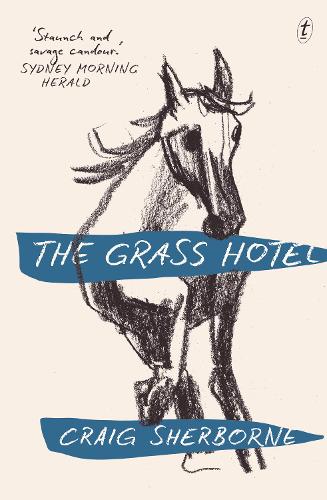
The Grass Hotel
(Paperback)
Publishing Details
The Grass Hotel
By (Author) Craig Sherborne
Text Publishing
The Text Publishing Company
1st February 2022
Australia
Classifications
General
Fiction
Family life fiction / Stories about family
Physical Properties
Paperback
208
Width 153mm, Height 234mm
Description
Carry me, son. Do not leave me behind.
Are you listening to me
Of course youre listening, you say, and add the F-word. Off you go to cope with a storm. Lucerne armfuls for horses. For cows, rye-spindly hay.
Alone in the paddocks of his grass hotel a man tends to his beloved horses, Sock and Boy. The voice of his motheraccusatory, fragmenting from dementiahaunts his every move, an excoriating reminder of his failures in the world of people.
The Grass Hotel is a story of damage and repair, of familial obligation and the resentments it can cause. It is also about the profound comfort that a connection with animals can offer.
With its extraordinary use of language, Craig Sherbornes novel is by turns savage and tender, raw and poetic: a small masterpiece.
Reviews
Pays homage to the body in all its vulnerabilitiesThe Grass Hotel is an unsparing but humane portrait of a mother and son. * Books+Publishing *
'Sherbornes talents with narrative and poetry combine to produce a striking fictionoffering a unique, vivid portrait of his characters. With the crystallisation and compression of poetry, Sherborne explores ideas of property, freedom and loyalty, and produces a novel as beautiful in its conjunctions as the chandelier swinging over its landscapes.' * Australian on Tree Palace *
'A riveting piece of writing that is liable to transfix any reader who gets past the opening chapterSherborne is a breathtaking writer because he writes of unspeakable things with a kind of affectless gaucherie that dazzles the mindthis is an engulfing, heart-stopping booka performance that dazzles the eyes and leaves the reader gasping for air.' * Age/SMH on The Amateur Science of Love *
The novels poetic, image-rich, disjointed realm is immersive and memorableThe Grass Hotel leaves us with a persuasive articulation of familial power dynamics, their emotional turbulence. * Guardian *
[Craig Sherborne] writes simple sentences full of emotional powerThis [is a] soul-searching novel, in which long-suppressed memories are hinted at and then slowly released. * Stephen Romei, Saturday Paper *
'At every turn the books natural lyricism and gentle melancholy rub against [a] darker moodresentment, disappointment, all the unsettled scores of parent and child, even after death...At every turn the prose is taut, fractured and imagistica sustained act of broken beauty over 200 pages[Sherborne] has used fiction and imagination to raise the contemptuous cliche of a common life to the highest fury and powerWhat matters more than the mere actual of personal history is the summoned force of art, and its here where the books power lies. It is genuinely haunted, and haunts in turn. * Adam Rivett, Age *
Sherborne does an incredible job with the mothers narration...Brilliantly written. * Good Reading *
[A] remarkable feat of wordsmithingIts a version of a black and terrible joke that the person who has lost correct and coherent language is written by someone who is something of a word magician...The Grass Hotel stands alone as a virtuosic deferral of self-examination by delivering an often cruel version of a woman who has lost her mind. * Australian Book Review *
[The Grass Hotel] shows off Sherbornes considerable experience as both a poet and playwright. * Big Issue *
Told in a sometimes comic, sometimes abrasive wild poetry. * Advertiser *
Author Bio
Craig Sherbornes memoir Hoi Polloi was shortlisted for the Queensland and Victorian Premiers Literary Awards. The follow-up, Muck, won the Queensland Literary Award for Non-fiction. Sherbornes debut novel, The Amateur Science of Love, won the Best Writing Prize in the 2012 Melbourne Prize for Literature and was shortlisted for the NSW and Victorian Premiers Awards. He has also written two volumes of poetry, and his journalism and poetry have appeared in most of Australias leading literary journals and anthologies. His two most recent novels are Tree Palace, shortlisted for the Miles Franklin Literary Award, and Off the Record.
